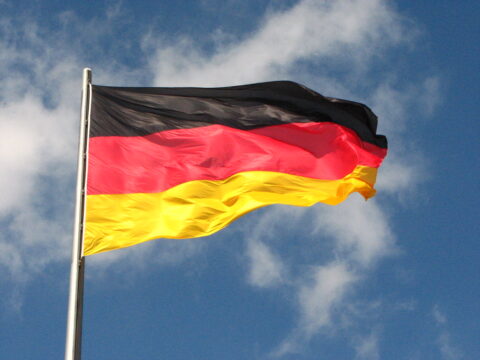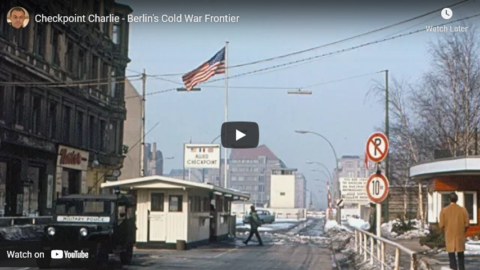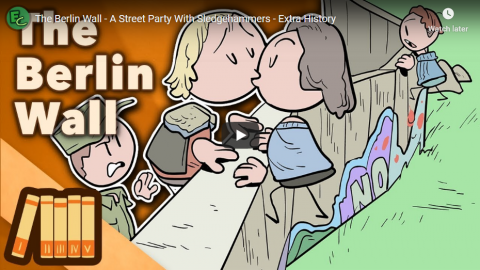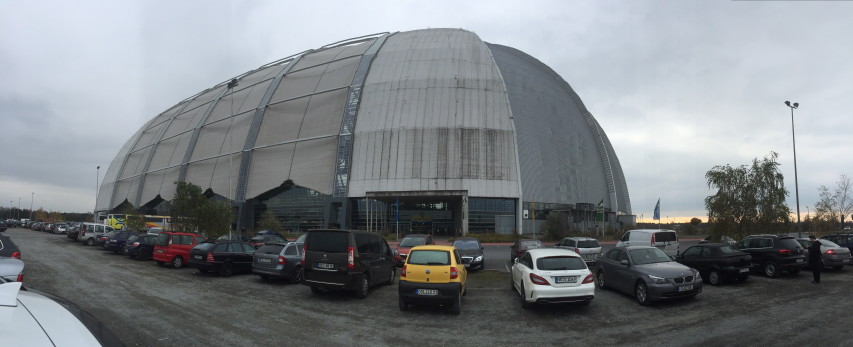TimeGhost History
Published 21 Mar 2025By 1947, Stalin’s Soviet Union has begun to firmly grip Eastern Europe, reshaping nations through rigged elections, terror tactics, and propaganda. From Poland to Bulgaria, countries are forced into Moscow’s orbit, crushing opposition and extinguishing democratic freedoms. As Truman declares a doctrine to contain communism, the stage is set for decades of Cold War confrontation.
(more…)
March 23, 2025
Rigged Votes and Terror: Stalin’s Takeover Tactics! – W2W 014 – 1947 Q2
February 25, 2025
German election results
Germany voted on Sunday (on paper, and the votes all got counted in less than 24 hours) and the most likely result will be a coalition between the centre-right CDU and the social democratic SPD, excluding the second-largest party, the extremely extreme extreme right-wing AfD:
The federal elections in Germany are over, and the preliminary count is in. The CDU/CSU have narrowly avoided the Kenyapocalypse, as the Bündnis Sahra Wagenknecht failed to meet the 5% hurdle for representation in the Bundestag by a mere 13,435 votes. In consequence, the Social Democrats and the Union parties together will command a thin but workable parliamentary majority of 328 seats. In all likelihood, we will have a black-red government under CDU Chancellor Friedrich Merz – a not-so-grand coalition of the kind we grew used to under Angela Merkel.
Here is a district-by-district map of the election results, with each district coloured according to the winning party. Black is CDU/CSU, blue is AfD, red is SPD and green is Green:
My district is the one all the way due south of Munich on the Austrian border. The CSU got 41.9% of the party vote here – one of their best showings in all of Bavaria.
The Losers
The preliminary results of each party compared to the last elections in 2021 reveal last night’s losers clearly enough:
This vote was as poignant a rejection of Olaf Scholz’s parodically bad traffic light coalition as anyone could imagine. Everybody has improved at the expense of red-green-yellow, but it is interesting to observe who has done the worst.
The Greens dominated the traffic light, and voters have dealt them the lightest punishment of all. Imagine how crazy you have to be ever to enter a government with this toxic party: They get their way on all major political issues and you get punished for it. Even so, the Greens did much worse than I thought they would. Almost everybody beyond their hardcore devotees has abandoned them, and Green Chancellor Candidate Robert Habeck (who also lost his direct mandate in Flensburg-Schleswig) has announced he will never again seek a leading role in the party. We have finally rid ourselves of his Majesty the Sun Chancellor, the champion of speech crime charges, and that alone is worth a stiff celebratory scotch.
The FDP lost far harder than the Greens. Last night was their worst showing of all time – worse even than the last time they were chased out of the Bundestag in 2013. Party chief Christian Lindner will resign and withdraw from politics, and he should. The FDP stood idly by and waved through ruinous Green policies like the building heating ordinances, all the time pleading that things would be even worse if the FDP weren’t in government. After the constitutional court in Karlsruhe killed the budgetary schemes of the traffic light, the FDP could have left the coalition, but they subjected all of us to another year of Scholzian incompetence and insanity. If there is any justice in the world the FDP will become a minor West German party that nobody thinks about anymore.
The next biggest loser of the night was the Social Democrats, who likewise booked their worst electoral result in history, and also achieved the worst-ever electoral collapse of a chancellor party in the 80-year history of the Federal Republic. Olaf Scholz has said he will not participate in any future government or coalition negotiations, and party co-chair Lars Klingbeil spoke last night of a “caesura” in the history of the SPD, promising substantial changes in party leadership. The first such change happened almost immediately, with the resignation of SPD faction leader Rolf Mützenich. Klingbeil will replace him. Many expect that Klingbeil’s co-chair, Saskia Esken, will also be forced out before long, although she is clinging to her job for the moment.
Looking from the US, CDR Salamander notes the very high turnout for a federal election with approval:
Sunday, Germany held national elections for the parliament, the Bundestag. Congrats to the German people and their ~83% turnout, the greatest I believe, since unification.
The previous government led by SPD and hobbled the the Greens was unstable at best, and was not doing great things for the German people. That would be why the SPD’s results were the worst since 1887.
Defense Minister Boris Pistorius has clear words for the performance of his SPD. “This is a devastating, catastrophic result,” he said. “There is no way to sugarcoat it.” He congratulated the Union on its election victory. “I hope that — especially in view of Friedrich Merz’s speech in Munich yesterday — they will now strike the right tone and understand that it is about keeping the democrats together and not playing them off against each other.” An AfD at 20 percent cannot leave the Social Democrats in particular at rest.
Nuff said.
The above numbers were from Sunday night and are not final, but we can safely assume that they are roughly where the final count will be.
You need 316 seats to control, and you need 5% to enter government. That last bit puts FDP and BSW out of the picture. I’ll chat a bit about that at the bottom of the post, but let’s focus on the big boys.
First things first, Germany voted for right-wing governance. CDU/CSU (Union), and AfD got 49.2% of the vote. However, no one will form a government with them, so the Germans will not be getting what they voted for.
[…]
AfD broke into the former West Germany. Both Kaiserslautern and Gelsenkirchen voted for AfD. I also find it interesting that in addition to the West Germany/East Germany divide, the East Berlin/West Berlin divide is still there.
History is sticky.
I lived with Germans for four years, yet I don’t fully grasp German politics. Still, some political constants hold true everywhere.
Again, the Germans voted for a right-wing government. With Union having to partner with SPD, that will pull the center of the government to the left, further away of the center of the electorate … again.
Were I a German, I would want a few things, in this order:
- Cheaper energy — lower monthly bills and prices across the board. It will also make German manufacturing more competitive. Yes, the only way to do that is to restart the nuclear power plants. With the Greens gone, no reason not to.
- Stop migration. Expel illegal migrants. If someone has vacationed in the nation they claimed to seek asylum from, deport them. Etc.
- Be a player in ending the war in Ukraine, if it can be ended. If Russia refuses to be reasonable at the table, then fully back the Ukrainian fight. As this is aligned with the general direction of the USA and other allies, it makes sense.
- Redouble spending on national defense. 2% will not do. 2.5% is the floor, and must be reached faster.
All the four above will be more difficult with SPD in government. Remember my long-held position that applies everywhere, not just in Germany:
When the center-right and center-left refuse to address the legitimate concerns of the people, especially in issues of migration and culture, then the people will look elsewhere for their concerns to be met.
If AfD were brought into government, they would be forced to moderate and to be held accountable for the action of government. With AfD in opposition — with a bone in their teeth — they will most likely, if they do not implode due to their well-known “personnel challenges”, they will increase their popularity with voters.
October 13, 2024
Occupation of Germany, Plunder and Enslavement?
World War Two
Published 12 Oct 2024The Allies’ occupation of Germany was marked by competing visions for its future, ranging from France’s focus on security to the Soviet push for reparations. This episode dives into the complex negotiations that determined Germany’s borders, industrial disarmament, and economic management, all of which would shape Europe’s post-war order and fuel the East-West divide.
(more…)
May 16, 2024
August 25, 2023
The German Democratic Republic, aka East Germany
Ed West visited East Berlin as a child and came away unimpressed with the grey, impoverished half of Berlin compared to “the gigantic toy shop that was West Berlin”. The East German state was controlled by the few survivors of the pre-WW2 Communist leaders who fled to the Soviet Union:
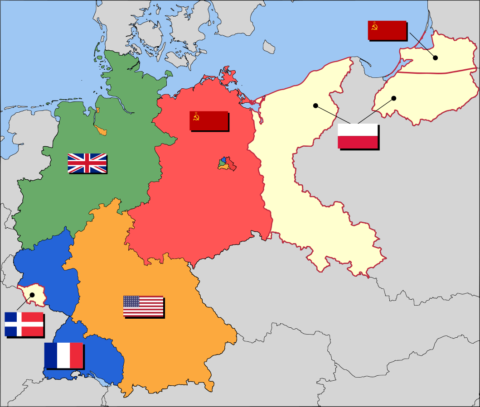
Occupation zone borders in Germany, 1947. The territories east of the Oder-Neisse line, under Polish and Soviet administration/annexation, are shown in cream as is the likewise detached Saar protectorate. Berlin is the multinational area within the Soviet zone.
Image based on map data of the IEG-Maps project (Andreas Kunz, B. Johnen and Joachim Robert Moeschl: University of Mainz) – www.ieg-maps.uni-mainz.de, via Wikimedia Commons.
In my childish mind there was perhaps a sense that East Germany, the evil side, was in some way the spiritual successor both to Prussia and the Third Reich – authoritarian, militaristic and hostile. Even the film Top Secret, one of the many Zucker, Abrahams and Zucker comedies we used to enjoy as children, deliberately confused the two, the American rock star stuck in communist East Germany then getting caught up with the French resistance. The film showed a land of Olympic female shot put winners with six o’clock shadows, crappy little cars you had to wait a decade for, and a terrifying wall to keep the prisoners in – and compared to the gigantic toy shop that was West Berlin, I was not sold.
I suppose that’s how the country is largely remembered in the British imagination, a land of border fences and spying, The Lives of Others and Goodbye Lenin. When the British aren’t comparing everything to Nazi Germany, they occasionally stray out into other historic analogies by comparing things to East Germany, not surprising in a surveillance state such as ours (these rather dubious comparisons obviously intensified under lockdown).
This is no doubt grating to East Germans themselves, but perhaps more grating is the sense of disdain often felt in the western half of Germany; for East Germans, their country simply ceased to exist in 1990 as it was gobbled up by its larger, richer, more glamorous neighbour, and has been regarded as a failure ever since. For that reason, [Katja] Hoyer’s book [Beyond the Wall] is both enjoyable holiday reading and an important historical record for an ageing cohort of people who lived under the old system. To have one’s story told, in a sense, is to avoid annihilation.
Despite the similarities between the two totalitarian systems, East Germany almost defined itself as the anti-fascist state, and its origins lie in a group of communist exiles who fled from Hitler to seek safety in the Soviet Union. Inevitably, their story was almost comically bleak; 17 senior German Marxists in Russia ended up being executed by Stalin, suspected by the paranoid dictator of secretly working for Germany. Even some Jewish communists were accused of spying for the Nazis — which seems to a rational observer unlikely. As Hoyer writes, “More members of the KPD’s executive committee died at Stalin’s hands than at Hitler’s”.
Only two of the nine-strong German politburo survived life in Russia, one of these being Walter Ulbricht, the goatee-bearded veteran of the failed 1919 German revolution and communist party chairman in Berlin in the years before the Nazis came to power.
The war had brutalised the eastern part of Germany far more than the West. It suffered the revenge of the Red Army, including the then largest mass rape in history, and the forced expulsion of millions of Germans from further east (including Hoyer’s grandfather, who had walked from East Prussia). The country was utterly shattered.
From the start the Soviet section had huge disadvantages, not just in terms of raw materials or industry – western Germany has historically always been richer — but in having a patron in Russia. While the Americans boosted their allies through the Marshall Plan, the Soviets continued to plunder Germany; when they learned of uranium in Thuringia they simply turned up and took it, using locals as forced labour.
“In total, 60 per cent of ongoing East German production was taken out of the young state’s efforts to get on its feet between 1945 and 1953,” Hoyer writes: “Yet its people battled on. As early as 1950, the production levels of 1938 had been reached again despite the fact that the GDR had paid three times as much in reparations as its Western counterpart.”
After the war, so-called “Antifa Committees” formed across the Soviet zone, “made up of a wild mix of individuals, among them socialists, communists, liberals, Christians and other opponents of Nazism”. Inevitably, a broad and eclectic left front was taken over by communists who soon crushed all opposition.
And as with many regimes, state oppression grew worse over time. “By May 1953, 66,000 people languished in East German prisons, twice as many as the year before, and a huge figure compared to West Germany’s 40,000. The General Secretary’s revival of the ‘class struggle’, officially announced in the summer of 1952 as part of the state’s ‘building socialism’ programme, had escalated into a struggle against the population, including the working classes.” The party was also becoming dominated by an educated elite, as happened in pretty much all revolutionary regimes.
Protests began at the Stalinallee in Berlin on 16 June 1953, where builders marched towards the House of Ministries and “stood there in their work boots, the dirt and sweat of their labour still on their faces; many held their tools in their hands or slung over their shoulders. There could not have been a more fitting snapshot of what had become of Ulbricht’s dictatorship of the proletariat. The angry crowd chanted, ‘Das hat alles keinen Zweck, der Spitzbart muss weg!’ – ‘No point in reform until Goatee is gone!'”
The 1953 protests were crushed, the workers smeared as fascists, but three years later came Khrushchev’s famous denunciation of Stalin, which caused huge trauma to communists everywhere. “The shaken German delegation went back to their rooms to ponder the implications of what they had just learned.” By breakfast time, “Ulbricht had pulled himself together”, and decreed the new party line. Stalin, it was announced “cannot be counted as a classic of Marxism”.
March 4, 2022
Checkpoint Charlie – Berlin’s Cold War Frontier
Mark Felton Productions
Published 4 Dec 2018The history of Checkpoint Charlie, the most famous of Berlin’s East-West crossing points and the focus of a serious standoff between the US and Soviet Union in 1961 that could have led to World War III.
Support Mark at Patreon for $1 a Month!
https://www.patreon.com/markfeltonpro…
May 2, 2020
After The Berlin Wall: Making Germany’s Armed Forces (Bundeswehr 1991 Documentary)
Forces TV
Published 5 Jan 2018It’s more than 27 years since German reunification, when East and West Germany came together again after the fall of the Berlin Wall. This documentary looks at the challenges facing the West German Army as they took over the East German National People’s Army.
Read more: http://www.forces.net/news/comment-bu…
Subscribe to Forces TV: http://bit.ly/1OraazC
Check out our website: http://forces.net
Twitter: https://twitter.com/ForcesNews
How things change … back in 1991, the Bundeswehr had a vast over-supply of military vehicles between the mass of Soviet-era equipment inherited from the DDR and the excess due to planned down-sizing of Germany’s overall military expenditure (the “peace dividend”). Earlier this year, Bild reported that German soldiers are being advised to take personal vehicles during military training exercises, due to a lack of infantry fighting vehicles and other military transport.
November 11, 2019
The Berlin Wall – A Street Party With Sledgehammers – Extra History
Extra Credits
Published 9 Nov 2019Thanks to World of Tanks for sponsoring this episode. Download the game on PC and use the invite code
CHECKPOINTCto claim your $15 starter pack https://tanks.ly/2NoVfjx.The Berlin Wall has become a symbol of the Cold War. It encircled West Berlin, separating it from the Soviet-controlled East Berlin, placed to try and stop the flood of skilled professionals leaving to the West. Multiple US presidents had penned speeches about tearing down the wall, to no effect. But the Wall did fall. As the USSR underwent massive reforms and the Velvet Revolution was underway, East Germany was undergoing its own reform. And one clerical oversight in a press conference will destroy the Wall for good.
Update: Austin Bay linked to a column he wrote in 2009 on the 20th anniversary of these events.
Many in the West, including the U.S., believed that the communists had history on their side. The wry debate reply from the defeatist lefties favoring unilateral U.S. nuclear disarmament was “better Red than dead.” For decades — I repeat, decades — this crowd had a media pulpit from which its self-proclaimed intelligentsia preached the moral equivalency of the U.S. and the Soviet Union, and at times dropped the all pretense and fingered the U.S. as the “fascist state” and global oppressor.
In the language of the defeatist left, the U.S. was the jailer, the warmonger, the threat to world peace.
The Berlin Wall’s collapse exposed that Big Lie, as did the documented moral, political, economic and ecological wretchedness of the Soviet Union. Unfortunately, we still hear echoes of this “blame America” cant lacing al-Qaida propaganda and the lectures of hard-left reactionaries like Bill Ayers. The great anti-American lies of the Cold War are recast as the great anti-American lies of the War on Terror.
Breaching the wall in 1989 was bloodless, but the Cold War certainly wasn’t. World War III did not break out along the intra-German border and produce a nuclear conflagration, but the Cold War’s battles on the periphery (e.g., Greece, Korea, Vietnam, El Salvador, Angola, Afghanistan) were expensive, fatiguing and deadly.
January 28, 2019
The Cold War – OverSimplified (Part 2)
OverSimplified
Published on 24 Jan 2019
January 26, 2019
The Cold War – OverSimplified (Part 1)
OverSimplified
Published on 24 Jan 2019
November 4, 2018
Statistics Canada wants to become “Stasi”-tistics Canada by grabbing personal financial data
“Stasi” was the abbreviation for the German Democratic Republic’s State Security Service, East Germany’s successor to the Gestapo. Not only did they perform similar functions to the Gestapo, they were even more involved in spying on Germans than their Nazi predecessors had been. Wikipedia says that “the Stasi employed one secret policeman for every 166 East Germans; by comparison, the Gestapo deployed one secret policeman per 2,000 people. As ubiquitous as this was, the ratios swelled when informers were factored in: counting part-time informers, the Stasi had one agent per 6.5 people. This comparison led Nazi hunter Simon Wiesenthal to call the Stasi even more oppressive than the Gestapo.” Statistics Canada doesn’t want to get the full story on us by physically spying — that’s the RCMP’s job — but they do want to grab huge amounts of our personal financial data to “ensur[e that] government programs remain relevant and effective for Canadians”. Terence Corcoran explains why this might not be such a good idea:
When news broke earlier this year that the accounts of maybe 600,000 Canadian Facebook users had been compromised, Ottawa swung into action to shut down this alarming example of creeping surveillance capitalism. Scott Brison, then acting minister of democratic institutions, said his government had dispatched Canada’s national spy agency to make sure the privacy of Canadians had not been compromised. “Social media platforms have a responsibility to protect the privacy and personal data of citizens,” said Brison.
But when news broke last week that Statistics Canada wants to expand its inventory of data on Canadians by collecting real hard-core personal information on the banking activities of 500,000 Canadians annually, the Trudeau government was suddenly not at all concerned about privacy breaches or even the principle of privacy protection. Instead of waving a red flag over the prospect that StatCan would end up with computers full of private financial details on millions of citizens, Prime Minister Justin Trudeau brushed off privacy concerns, which he implied take a back seat to the government’s need for “high quality and timely data.” Such data, he said, are “critical to ensuring government programs remain relevant and effective for Canadians.”
Spoken like a true central planner and enthusiastic purveyor of policy-based evidence making. Nobody seems to know why StatCan wants to begin collecting personal banking information on individual Canadians, information that Canada’s bankers are rightly reluctant to provide. In the all-new era of fintech and blockchain, the great concern among regulators is how data privacy will be protected. At StatCan, the concern is: “How do we get our hands on the data?”
[…]
StatCan’s assurances on privacy protection are not all that reassuring. In a document dated October 2018 — obtained by David Akin at Global News— the chief statistician describes his agency’s “Generic Privacy Impact Assessment related to the acquisition of financial transactions information.” It is clear that the names of millions of Canadians, their bank account numbers and transactions, their bill payments and personal activities, will be collected and stored in government computers. StatCan is not merely getting useful generic data on the spending and banking habits of Canadians, it is collecting the actual spending and banking habits and names of individual Canadians.
It is one thing to collect and analyze statistics based on anonymous data. It is quite another to “require” — Arora’s word — that the banks provide “individual payments and income history.” Even though billions of bits of private, individual and personal information will be collected, StatCan says that, “Under no circumstances will the personal information obtained from financial institutions be used to perform credit, expenditure or income checks on individual Canadians.” He said none of the resulting statistical reports will include any personal data.
That’s not good enough.
September 25, 2017
QotD: IKEA’s shady history
IKEA itself serves as a fitting symbol of the middle-class masquerade. The company’s well-managed brand obscures the fact that its founder, Ingvar Kamprad, at the time that he founded the store in 1943, was a member of Sweden’s pro-Nazi fascist party, in which he continued to be active at least until 1948 and which he continued to praise for decades after; or that the company used forced prison labor in East Germany until the fall of the Berlin Wall. It is fitting that IKEA’s current worth is unknown, since it is technically owned by a phony-charity shell company incorporated in the Netherlands, enabling Kamprad to evade Swedish taxes. This is not to single out IKEA for particular scorn: one could write an equally lurid laundry list about almost any large corporation; a fascist undertone usually lurks beneath the surface of mass-production and mass-marketing. Consider the fact that Apple uses what is slave labor in all but name in China yet none of their customers seem to care.
Samuel Biagetti, “The IKEA Humans: The Social Base of Contemporary Liberalism”, Jacobite, 2017-09-13.
November 5, 2015
QotD: The Berlin Wall
The Berlin Wall was a symbol of the depravity and viciousness of the Marxist idea. Karl Marx was a pure hate monger masquerading as a social philosopher. His ideas may, in the end, be summarized thus: wealth can be gained only by stealing from others, and thus successful people are evil, and thus it is okay to threaten or kill rich people (or even people who are just a bit better off than you are), to steal their belongings, and to threaten anyone who might in the future have more stuff than you do. If you somehow get more things than other people, it is okay for other people to take your stuff, and if you resist, it is okay to beat you up or kill you.
Even more succinctly, Marxism is the idea that envy is laudable, and should be turned into social policy with the use of pervasive violence.
I am putting this more bluntly and baldly than the average Marxist would. They prefer concealing their central idea beneath a heavy blanket of words. They dress up their “philosophy” in avant garde costumes, adding layers of verbiage, complicated and counterfactual claims about language and logic, bizarre ideas about the nature of history, etc., all in the service of keeping people from seeing what they’re actually suggesting. What lies underneath is nothing much more than hate of people who have more stuff than you do, justified by little or nothing more than wanting to take what they have for yourself.
When you base your beliefs on this sort of foundation, the violence that proceeds is not an accident or the result of an improper understanding or implementation of an otherwise fine program. The violence is the direct and intentional result of the underlying program. The violence is the entire purpose of the underlying program.
In spite of the claims of apologists, the Marxism that fell twenty five years ago was the true Marxism. You cannot force people to work whether they get any benefit of it or not if they can flee from you, so you have to build walls. The Berlin Wall was not an aberration, it was the the only way to keep the quite literal slaves from fleeing their bondage. You cannot take stuff from people who have it without goons with guns, since they will not want to hand their material possessions over, so you bring in goons with guns to scour your population. In a free market, you get ahead by making things people want like bread or telephones, but in a Marxist society, the only way to get ahead is through gaining political power, and so people who are exceptionally talented at deploying violence and thuggery and are ambitious rise to the top of your society. Stalin or someone like him was not an accident, he was an inevitability.
Perry Metzger, “A memorable anniversary, and those who would forget it”, Samizdata, 2014-11-09.
July 16, 2015
The hidden scale of East Germany’s economic disasters
Earlier this month, David Pryce-Jones wrote about one of the 20th century’s greatest con-men and his unbelievable role in the East German economy:
Alexander Schalck-Golodkowski was a most ingenious conman. The world at large never knew about him because he stayed in a little circle of corrupt political and financial insiders with whom he was doing his dirty businesses. In a mind-blowing interview that I had with Günter Mittag, the East German minister of finance, I first heard something about Golodkowski. The collapse of Communism allowed Mittag to speak more freely. Communist East Germany, he said, had always been an economic disaster, so much so that he had never dared tell Erich Honnecker, the Party first secretary, the truth that the state had no money. Mittag made up the numbers. For cash to keep up the pretenses, he turned to Golodkowski, giving him permission to do whatever he thought might be profitable. The measure of Golodkowski’s success was the CIA’s preposterous judgement that East Germany had the tenth-largest economy in the world.
Golodkowski operated through KoKo, a company set up for him freed from the laws and restrictions of both Communism and capitalism. A colonel in the Stasi secret police, he had protection the Mafia would have envied. Through bankers in West Germany and Switzerland he set up false accounts and shell companies. He was an arms trader, a speculator in commodities, and a specialist in bogus insurance claims. One of his scams was to “liberate” 600 old master pictures from the Dresden Museum and sell them. In 22 years of illegal operations, Golodkowski himself estimated (with understatement no doubt) that KoKo had amassed 27.8 billion East German marks.
November 28, 2014
A visit to an Earthbound L5 colony
Charles Stross visits the closest thing to an O’Neill L5 colony:
To the eternal whine of the superannuated free-range SF geek (“dude, where’s my jet pack? Where’s my holiday on the moon? Where are my food pills? I thought this was supposed to be the 21st century!”) can be added an appendix: “and what about those L5 orbital space colonies the size of Manhattan?”
Well, dude, I’ve got your L5 colony right here. In fact, they turned it into a vacation resort. I just spent a day checking it out, and I’m back with a report.
[…]
So here’s what happens. One morning you get up early in your hotel or apartment in Berlin. You collect your swimming gear, flip-flops, beach towel, and sundries. Then you wrap up warm, because of course it’s November in Prussia and while it’s not snowing yet the wind has a sharp edge to it. You head for Zoologischer Garten station (or maybe the Ostbahnhof if you’re on that side of the city) and catch a train, which over the next hour hums through the pancake-flat forests and villages of East Germany until it stops at a lonely (but recently modernized) platform in a forest in the middle of nowhere.
You’re wondering if you’ve made some sort of horrible mistake, but no: a shuttle bus covered in brightly colored decals depicting a tropical beach resort is waiting for you. It drives along cracked concrete taxi-ways lined with pine trees, past the boarded-up fronts of dispersal bay hangers and hard stands for MiG-29 interceptors awaiting a NATO attack that never came. The bus is raucous with small children, chattering and screeching and bouncing off the walls and ceiling in a sugar-high — harried parents and minders for the large group of schoolgirls in the back of the bus are trying to keep control, unsuccessfully. Then the bus rumbles and lurches to a standstill, and the doors open, and you see this:
It’s hard to do justice to the scale of the thing. It’s one of those objects that is too big to take in at close range, and deceptively small when viewed from a distance. It’s like an L5 space colony colony that crash-landed in on the West Prussian plains: a gigantic eruption from the future, or a liminal intrusion from the Gernsbackian what-might-have-been.
[…]
Welcome to Tropical Islands, Germany.
You can get the history from the wikipedia link above: in a nutshell, the Zeppelin hangar was bought from the liquidators by a Malaysian resort operator, who proceeded to turn it into an indoor theme park. They stripped off a chunk of the outer cladding of the hangar and replaced it with a high-tech greenhouse film: it’s climate-controlled, at 26 celsius and 64% humidity all year round. (That’s pretty chilly by Malaysian standards, but nice and comfortable for the German and Polish customer base.) There’s an artificial rainforest, with over 50,000 plants and a 5km long walking trail inside. There are about a dozen different saunas, hot tubs, and a swimming pool complex: there’s a 200 metre long artificial beach with sun-loungers for you to work on your tan wrapped around an artificial tropical lagoon — a 140 metre swimming pool with waves. There are bars, shops, restaurants, hotels, even a camp ground for tents: and of course the usual beachside resort song and dance show every evening.



